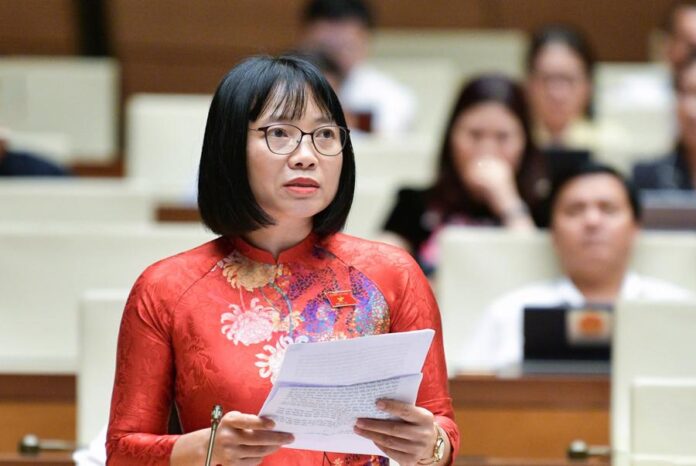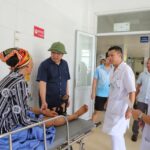Speaking during the discussion on the amendment to the Law on Health Insurance on the afternoon of October 31, 2024, delegate Nguyen Thi Viet Nga from Hai Duong Province emphasized that amending some contents of the Law on Health Insurance is in line with the aspirations and wishes of voters, as well as changes in the legal system and socio-economic situation compared to the previous period.
The expansion of health insurance coverage as drafted in the law is basically in line with the aspirations, wishes, and expectations of the voters. Providing maximum support for groups of health insurance participants is one of the fundamental social security policies with a humanitarian nature.
PROPOSAL FOR HEALTH INSURANCE FOR FAMILY MEMBERS OF FULL-TIME MILITIA
During the law-making process this time, the drafting committee added a group of subjects who are entitled to health insurance paid by the state budget, including family members of full-time militiamen.
According to the Law on Self-Defense and Militia, full-time militiamen are those who are permanently assigned to critical national defense areas. During their term of service, their working hours are regular, similar to officers and professional soldiers. This sets them apart from other forces under the self-defense and militia forces, such as local militia and mobile militia.
Therefore, “consideration can be given to providing health insurance coverage for their family members, similar to the coverage provided for the family members of the armed forces, based on impact assessments and budget balancing.”
“This is not only a show of concern and encouragement for the full-time militia but also a way to attract qualified individuals to actively join the full-time militia, contributing to the country’s protection and development,” emphasized delegate Nguyen Viet Nga.
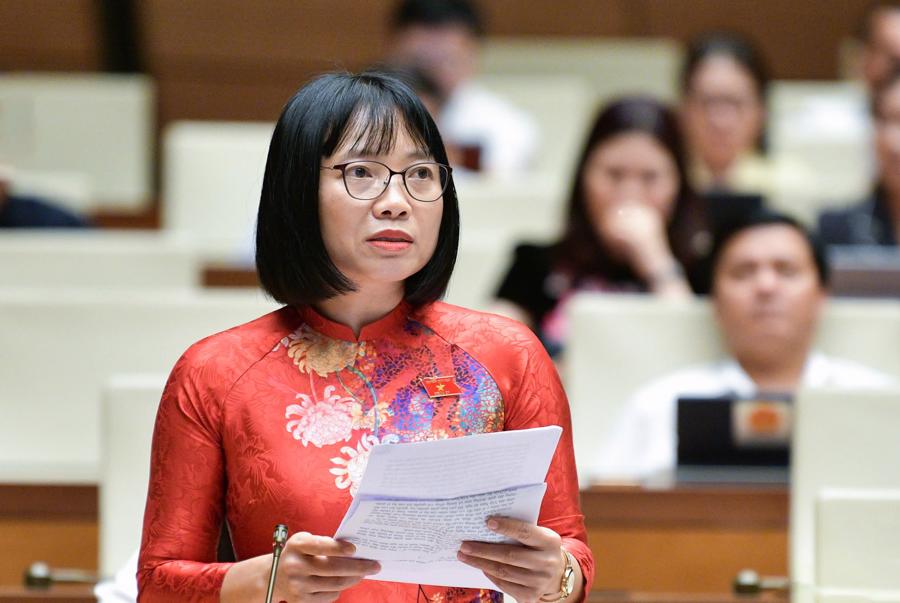
This proposal was also suggested by several other delegates. When providing input on the beneficiaries of state budget support, in addition to the groups specified in the draft Law, some delegates also recommended including family members of full-time militiamen.
According to delegate Nguyen Hoang Bao Tran from Binh Duong Province, full-time militiamen play a crucial role and are assigned to critical areas to protect the nation, borders, and islands. They face numerous challenges in safeguarding national security. To ensure that this force can focus on their duties without worry, Delegate Tran proposed that their family members should be provided with health insurance coverage supported by the state budget.
Sharing the same viewpoint, delegate Phan Van Xung from Ho Chi Minh City mentioned that the Law on Self-Defense and Militia of 2019 stipulates that full-time militiamen are permanently assigned to critical national defense areas and are directly involved in counter-terrorism, hostage rescue, crime suppression, riot control, dangerous epidemic prevention in high-risk areas, rescue, disaster relief, and firefighting. They operate regardless of day or night in remote, border, and island areas, facing dangerous environments that pose risks to their health and lives.
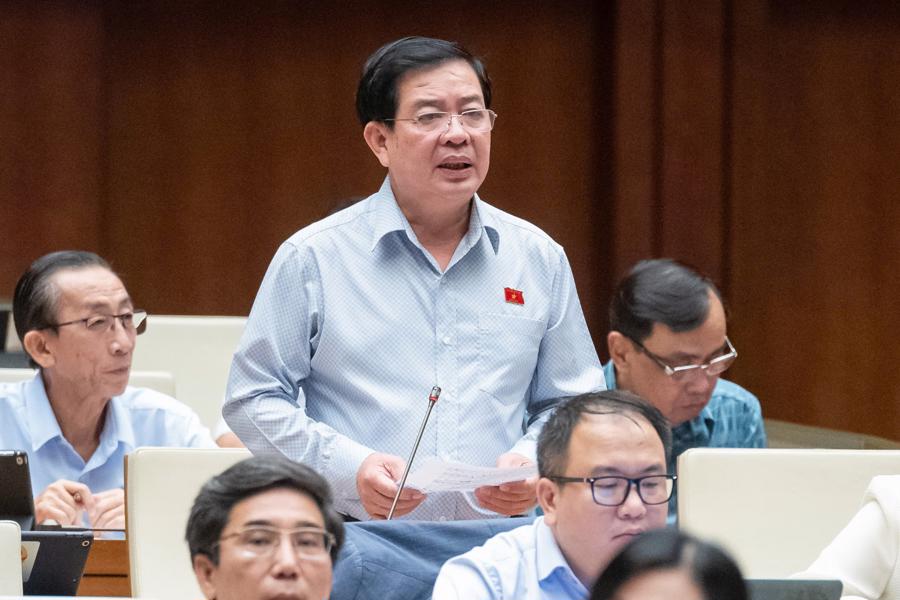
In the COVID-19 pandemic, the militia was the core and crucial force in the fight against the virus. Ho Chi Minh City alone had over 36,000 militiamen involved in this effort. Their tasks were demanding and complex, requiring timely responses in remote, border, and island areas. Their working conditions were exceptionally dangerous, impacting their health and lives.
Additionally, the term of service for full-time militiamen is two years. After completing their term, they are recognized as having fulfilled their military service. Full-time militiamen are entitled to social insurance and health insurance benefits similar to non-commissioned officers and soldiers of the Vietnam People’s Army. This ensures parity with other forces with similar operational characteristics.
In reality, in many localities, full-time militiamen enjoy the same policies as non-commissioned officers, but their family members are not yet provided with health insurance cards funded by the state budget. Therefore, the delegate proposed adding a provision to include health insurance coverage for the family members of full-time militiamen.
CLEARLY DEFINE THE BENEFICIARIES WITHIN THE GROUP COVERED BY THE STATE BUDGET
Commenting on the beneficiaries of health insurance, delegate Mai Van Hai from Thanh Hoa Province suggested clearly defining the beneficiaries within the group covered by the state budget, even though the draft Law has already included various additional groups, reflecting the goal of achieving universal health insurance.
Taking a different stance, delegate Pham Van Hoa from Dong Thap Province recommended that the drafting committee carefully consider the expansion of health insurance coverage. While acknowledging the necessity and public support for broadening the scope of beneficiaries, Delegate Hoa suggested a cautious approach regarding the inclusion of individuals engaged in other tasks within the organizational cipher system and their family members as part of the group where health insurance contributions are made by employees and employers. This is because the organizational cipher system encompasses a diverse range of individuals.
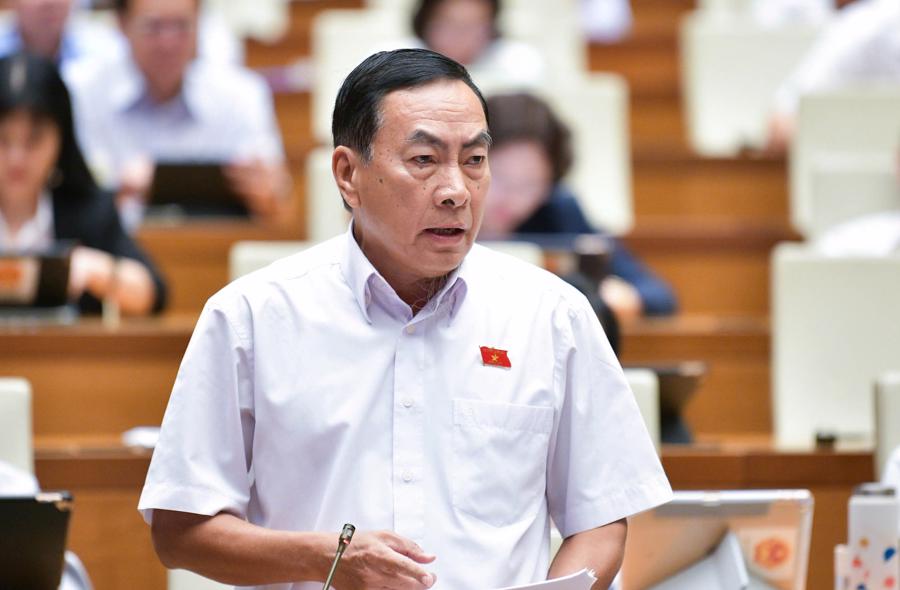
Based on this analysis, Delegate Pham Van Hoa proposed that only those engaged in cipher tasks and their family members should be considered beneficiaries of employer-paid health insurance. For other individuals within the organizational cipher system, it is suggested that they should not be covered by state-funded health insurance to maintain equality with other groups.
Furthermore, regarding the inclusion of full-time militiamen and their family members, it is worth noting that in the past, the full-time militia did not have a specific regime. However, with the enactment of the Law on Self-Defense and Militia, the militia has been provided with a monthly allowance and social insurance coverage. Therefore, the delegate from Dong Thap Province expressed the view that “adding health insurance coverage for the family members of the self-defense militia is unreasonable.”
In the discussion, delegate To Ai Vang from Soc Trang Province stated that the health insurance policy, in general, and the health insurance policy within the military, in particular, have demonstrated the humane aspect of the Party and State’s social security work. This has resulted in improved healthcare for not only military personnel but also their family members, contributing to a stronger motivation for soldiers to dedicate themselves to their duties.
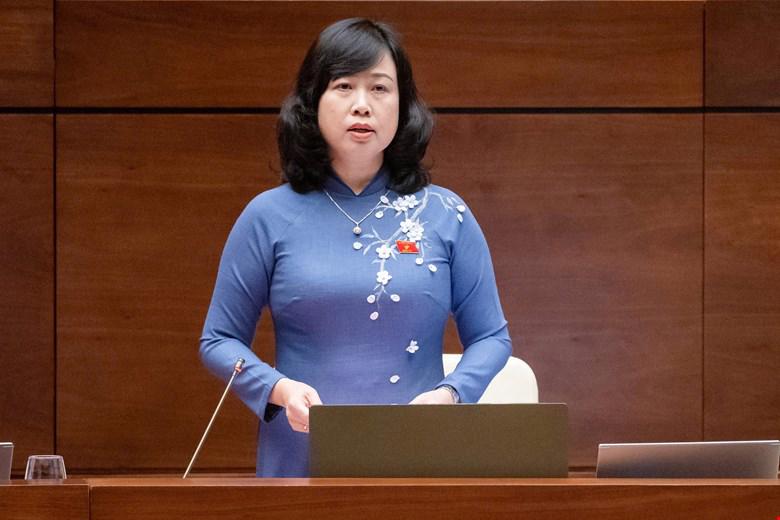
Adopting the perspective that social health insurance is a social security policy, Resolution 28 of the 12th Central Committee on reforming social insurance policies affirmed the establishment of the Social Insurance Fund based on safety, sustainability, and efficiency principles. “I sincerely hope that the National Assembly and the Government will consider expanding the scope of beneficiaries, especially for the family members of the self-defense militia, to ensure parity with other forces with similar operational characteristics,” the delegate asserted.
Additionally, delegate Tran Quang Minh from Quang Binh Province recommended including “former youth volunteers who participated in post-1975 war recovery and economic construction” in the group of beneficiaries covered by state-funded health insurance. He also suggested adding households in areas with particularly difficult socio-economic conditions, with the state budget supporting 70% of their health insurance contributions. This is due to the ongoing challenges faced by residents in these areas, the impact of the COVID-19 pandemic, changes in poverty standards, and increases in the base salary, which have led to higher health insurance contributions. Furthermore, the awareness of rights and responsibilities regarding health insurance among people in these areas remains limited.
Meanwhile, delegate Chu Thi Hong Thai from Lang Son Province proposed that the drafting and reviewing agencies consider adding individuals residing in border communes to the group covered by state-funded health insurance.
On the other hand, delegate Thach Phuoc Binh from Tra Vinh Province and delegate Nguyen Thi Lan Anh from Lao Cai Province jointly recommended including elderly individuals in the group covered by state-funded health insurance in the draft law.
Minister of Health Dao Hong Lan provided clarification regarding the beneficiaries of health insurance, including students, family members of full-time militiamen, residents of ATK areas, border areas, and more. She expressed her willingness to review, assess, and ensure alignment with the legal system.
A Proposal to Increase Social Insurance Support for Freelancers
The voters of Can Tho City propose an increase in subsidies to support farmers and freelance workers. This initiative aims to encourage greater participation in social insurance schemes, thereby enhancing social security for these vulnerable groups in the future.
Struggling Businesses Seek Relief Amid Social Security Suspension, Pension Agency Responds
Troubled businesses propose social insurance agencies to support by extending the payment period for social insurance, health insurance, unemployment insurance and extending the period of calculating late payment interest

